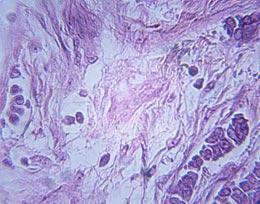 Drug found that kills breast cancer stem cells.Punchstock
Drug found that kills breast cancer stem cells.PunchstockPosted on 08/16/2009 7:20:12 AM PDT by neverdem
 Drug found that kills breast cancer stem cells.Punchstock
Drug found that kills breast cancer stem cells.Punchstock
A new approach for identifying drugs that specifically attack cancer stem cells, the cellular culprits that are thought to start and maintain tumour growth, could change the way that drug companies and scientists search for therapies in the war against cancer.
"We now have a systematic method that had not been previously known that allows us to find agents that target cancer stem cells," says Piyush Gupta of the Massachusetts Institute of Technology and the Broad Institute in Cambridge, Massachusetts, and first author of the study, published online today in Cell1.
Applying the technique, Gupta and his colleagues discovered one of the first compounds that can selectively destroy cancer stem cells. The drug, an antibiotic commonly fed to pigs and chickens, reduces the proportion of breast cancer stem cells by more than 100-fold compared with a drug widely used in chemotherapy for breast cancer.
Although most cancer therapies wipe out the vast majority of tumour cells, they have not been able to eliminate the cause of the disease — the cancer stem cells — so the cancer often comes roaring back with a vengeance. Researchers have looked for drugs that preferentially target cancer stem cells, but these repeat-offender cells are so rare that screening for potential compounds has been nearly impossible. The study team, led by Robert Weinberg and Eric Lander, also from the Massachusetts Institute of Technology, exploited a trick, boosting the number of cancer-stem-cell-like cells to find a molecular missile that homes in on the real target.
By silencing a specific gene in breast cancer cells, the researchers coaxed them to convert from epithelial cells, which make up most of the human body, into mesenchymal cells, which have many stem-cell-like characteristics. They then used these cells — which have the same molecular signatures as cancer stem cells and are equally drug resistant — to screen around 16,000 chemicals. They found 32 contenders, then whittled the list down to one drug: salinomycin, an antibiotic often found in animal feed.
With a candidate compound in hand, the researchers tested it against the target: stem cells in breast cancer cell lines. In comparisons between salinomycin and paclitaxel, a drug used to treat women with advanced breast cancer, salinomycin repeatedly reduced the proportion of cancer stem cells whereas paclitaxel, also known as Taxol, had the opposite effect. "It's definitely a step forwards," says cancer biologist John Dick of the University of Toronto in Canada, who was not involved in the research.
It's not yet exactly clear how salinomycin eradicates cancer stem cells or whether the compound will find its way into the clinic, says Gupta. His team is using the drug to disrupt various stages of tumour formation and conducting larger scale chemical screens to uncover other cancer-stem-cell-specific candidates.
Michael Lewis, a breast cancer researcher at Baylor College of Medicine in Houston, Texas, says that the paper will force drug companies to reconsider how they screen for agents that block tumour-initiating capacity. "If I was a big pharma company and I had 30,000 compounds on the shelf, I'd screen them all" with this technique, he says. The study's only limitation, he notes, is that the researchers measured the effect of their drug on cancer cell lines rather than on material taken from actual tumours.
OK, I was just diagnosed with bc (I refuse to give it the dignity and attention of capitalizing it, or even using its proper name.) Where do I sign up for the clinical trials, or, how much of this stuff should I ask my uncles, the farmers, for? (I think I might be kidding about asking my uncles, but I’m not sure!)
This is a methods paper. Any drug is years away. People see a press release and think a drug from the discovery is right around the corner. Go with the current drugs and methodologies.
If it really works in humans, the FDA will figure out a way to kill it.
Thanks, I’ll check it out! So....I guess this means no asking the uncles for some “feed”, huh? Wonder if this stuff is in the sileage?
link to abstract
Disclaimer: Opinions posted on Free Republic are those of the individual posters and do not necessarily represent the opinion of Free Republic or its management. All materials posted herein are protected by copyright law and the exemption for fair use of copyrighted works.